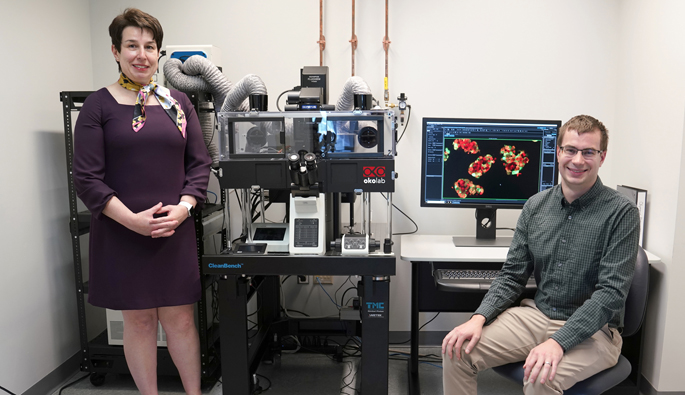
by Jill Clendening
More than 200 investigators from across the globe who specialize in islet biology, the study of hormone-producing cell clusters in the pancreas known as islets, recently gathered in Nashville to share knowledge and present the challenges and successes of their work during the first Islet Biology Workshop at Vanderbilt.
The loss or dysfunction of insulin-producing beta cells in islets is behind the development and progression of all forms of diabetes, and this community of scientists is working to uncover ways to either trigger beta cell regeneration or replenish lost beta cells using external sources such as human islets or stem cell-derived islet cells.
“Science is changing rapidly, and we wanted to create a venue for this community of investigators to discuss challenges and identify paths of opportunity,” said lead workshop organizer David Jacobson, PhD, associate professor in the Department Molecular Physiology and Biophysics. “Getting help from your peers in this big science world is critical for optimizing the analysis and interpretation of results. The meeting was designed as a workshop in order to facilitate the interactions of investigators and give young scientists an opportunity to present their work.”
The two-day workshop, held at the Student Life Center, was co-sponsored by Vanderbilt University (VU), the National Institutes of Health-funded Vanderbilt Diabetes Research and Training Center, the Vanderbilt Diabetes Center and the Islet Society, an independent society that promotes and supports islet research. The Vanderbilt Program in Developmental Biology and the Vanderbilt Center for Stem Cell Biology also supported the workshop.
In addition to Jacobson, co-organizers of the event were Maureen Gannon, PhD, professor of Medicine, Molecular Physiology and Biophysics, and Cell and Developmental Biology; and Chris Wright, DPhil, professor of Cell and Developmental Biology and director of the Program in Developmental Biology.
“We developed the Islet Biology Workshop at Vanderbilt because we felt this would be a great opportunity to showcase Vanderbilt as a research institution and also highlight the rich islet and diabetes research community we have here,” Gannon said.
During the workshop, presenters were asked to highlight barriers and opportunities encountered in their work, rather than describe research attendees had already read in a journal.
“It was our goal to generate an atmosphere for discussion that was challenging and would move the field forward so we could decide, as a unified islet community, how we standardize some of the analyses we’re using and what are the frontiers in islet biology research where we should all be moving,” Gannon said.
Both Jacobson and Gannon are looking forward to collaborations with other attendees that are now brewing as a result of the workshop. The event was such a success that the group plans to host the gathering at least every two to three years.
“Everyone’s goal is to find, if not a cure, at least new and better therapies for the diagnosis and treatment of type 1 and type 2 diabetes,” Gannon said. “By sharing what we’re all doing, then we all move closer to that goal.”

















